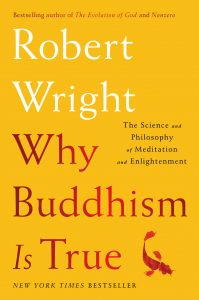 Despite its title, this is not a book about Buddhism being the one
true religion. It’s about how secular and philosophical insights of
Buddha provide practical solutions to the mind’s outdated software.
Despite its title, this is not a book about Buddhism being the one
true religion. It’s about how secular and philosophical insights of
Buddha provide practical solutions to the mind’s outdated software.
How we struggle with reactivity and distortions no longer adapted to civilization. Our biology still pursues ends useful to propagating dna, but these are often starkly opposed to individual happiness and peace of mind. In fact, it turns out that as long as we procreate, nature doesn’t care whether we drop dead of stress shortly thereafter.
The nerve janxed primate that jumps at every stick thinking it a snake is more likely to pass genes than the “what, me worry?” type. But the thing is, everything these days looks like snakes.
We do have a nascent faculty, however, this newfangled “consciousness” thing that dropped late in our development, apparently riding in with the neocortex. (Maybe from touching that monolith back in 2001?) It can put us back in the driver’s seat —if we can figure out how to use it. And oddly enough, Buddha some 2500 years ago actually talks about how that’s done.
Some of his crazy ideas about how we are caught in loops of suffering because of how we’re hardwired and hoodwinked are being corroborated by a slew of studies in the neurosciences and evolutionary biology. And his prescription for meditation has proven to bolster, even at the level of our physiologies, a resilience to stress and detachment from the conditioning (but not the conditions) that’s driving us nuts.
That’s what this book is about. Although he does get sidetracked at times with a pet project, trying to come up with analytical models for non-self and emptiness. Yeah, good luck with that.
aberrant mindmap notes here.